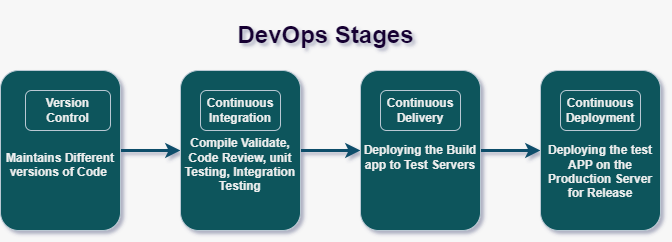- Published on
👨💻 What does DevOps entail? Who should consider acquiring DevOps skills and what are the reasons behind it? What can be expected in the future of DevOps?
- Authors
- Name
- Bounty Advice
- @BountyAdvice
DevOps is a way of working in software development where the development team and the operations team work together closely. It's like a bridge between the people who create the software and the people who make sure it runs smoothly. In traditional software development, the development team writes the code and hands it over to the operations team, who take care of deploying it and managing the infrastructure. This can lead to problems because the two teams often have different goals and ways of working.
DevOps aims to solve these problems by promoting collaboration and communication between the development and operations teams. It encourages them to work together from the beginning of the software development process until the end. This means that developers and operations people need to understand each other's work and support each other. By working together, they can automate processes, use tools that help them work more efficiently, and create a culture of shared responsibility. This helps to deliver software faster, with fewer errors, and makes it easier to respond to changes and fix problems quickly.
In simple terms, DevOps is about breaking down barriers between developers and operations teams, working together, and using automation and collaboration to make software development and deployment faster, smoother, and more reliable.


Key Principles of DevOps:
- Collaboration: DevOps promotes collaboration and encourages developers and operations teams to work together closely.
- Automation: Automation plays a crucial role in DevOps. By automating repetitive tasks, such as testing, building, and deploying software, organizations can reduce errors, save time, and improve efficiency.
- Continuous Integration and Continuous Delivery (CI/CD): CI/CD is a set of practices that involve automatically building, testing, and deploying software changes. Continuous Integration focuses on integrating code changes frequently, while Continuous Delivery ensures that software is always in a deployable state.
- Infrastructure as Code (IaC): IaC involves managing and provisioning infrastructure resources using code and configuration files. It enables consistent and reproducible infrastructure deployments, reduces manual errors, and facilitates easier scaling and maintenance.
- Monitoring and Feedback: DevOps encourages the use of monitoring tools and feedback loops to gather insights into the software's performance, usage, and user feedback. This information helps teams identify areas for improvement and make data-driven decisions.
Benefits of DevOps:
- Faster Time-to-Market: DevOps practices, such as automation and CI/CD, enable organizations to deliver software updates and new features more rapidly.
- Improved Collaboration: DevOps fosters collaboration and communication between teams, breaking down silos and creating a shared sense of responsibility.
- Enhanced Quality: By integrating testing and quality assurance processes into development cycles, DevOps ensures higher software quality.
- Increased Stability and Reliability: Automation and monitoring help identify and address issues early, leading to more stable and reliable software systems.
- Scalability: DevOps practices facilitate scaling infrastructure and applications to meet changing business needs efficiently.
DevOps Tools:
There are numerous tools available to support different aspects of DevOps. Here are some commonly used ones:
- Version Control Systems: Git, Subversion (SVN)
- Continuous Integration/Continuous Delivery: Jenkins, Travis CI, GitLab CI/CD, CircleCI
- Configuration Management: Ansible, Puppet, Chef
- Containerization and Orchestration: Docker, Kubernetes, Docker Compose
- Infrastructure Provisioning: Terraform, AWS CloudFormation, Azure Resource Manager
- Monitoring and Logging: Prometheus, ELK Stack (Elasticsearch, Logstash, Kibana), Grafana
Who Should Learn Devops and Why ?
DevOps is beneficial for a wide range of professionals and teams involved in software development and delivery. Here are some groups of people who should consider learning DevOps and the reasons why:
Developers: Learning DevOps enables developers to have a better understanding of the deployment and operational aspects of their applications. It allows them to collaborate effectively with operations teams, automate processes, and improve the overall quality of their code. Developers can benefit from incorporating DevOps practices to deliver software faster and with fewer errors.
Operations and System Administrators: Operations and system administrators are responsible for managing and maintaining the infrastructure and systems. By learning DevOps, they can automate repetitive tasks, implement infrastructure as code practices, and gain skills in tools and technologies that improve efficiency and scalability. DevOps knowledge allows them to work more closely with development teams, leading to smoother deployments and better collaboration.
Quality Assurance (QA) Engineers: QA engineers can benefit from learning DevOps practices to enhance their testing processes. DevOps encourages continuous testing and automation, enabling QA engineers to integrate testing earlier in the development cycle, provide faster feedback, and ensure high-quality software releases. DevOps also promotes collaboration between QA engineers, developers, and operations teams, fostering a culture of shared responsibility for quality.
Project Managers: Project managers play a crucial role in planning and managing software development projects. Learning DevOps principles allows them to effectively coordinate between development and operations teams, understand the implications of DevOps practices on project timelines and resource allocation, and promote efficient software delivery. DevOps knowledge empowers project managers to make informed decisions and foster a collaborative environment within their teams.
IT Managers: IT managers can benefit from understanding DevOps to drive organizational transformation and improve software delivery practices. DevOps principles help IT managers streamline processes, align development and operations teams, and optimize resource utilization. By learning DevOps, IT managers can enhance team productivity, reduce time to market, and align the organization with modern software delivery practices.
System Architects: System architects can benefit from learning DevOps to design systems that are scalable, resilient, and easily deployable. DevOps principles provide guidance on infrastructure automation, containerization, and orchestration, which are crucial aspects of modern application architecture. By understanding DevOps, system architects can design systems that align with DevOps practices, leading to smoother deployments and more efficient operations.
DevOps Engineers: DevOps engineers have a specialized role focused on implementing and managing DevOps practices, tools, and infrastructure. Learning DevOps is essential for individuals aspiring to be DevOps engineers, as it equips them with the necessary skills to automate processes, build and maintain CI/CD pipelines, manage infrastructure as code, and ensure smooth software delivery.
In summary, anyone involved in software development, deployment, and operations can benefit from learning DevOps. It fosters collaboration, improves efficiency, and enhances the overall quality of software releases. DevOps knowledge is valuable for individuals in technical roles, project management, and IT management, enabling them to deliver software faster, more reliably, and with better alignment between development and operations teams.
Future in DevOps
The future for DevOps looks promising and continues to evolve as technology advancements and industry needs shape the software development landscape. Here are some key aspects that highlight the future of DevOps:
Increased Adoption: DevOps adoption is expected to continue growing across industries. More organizations are recognizing the benefits of DevOps practices in terms of faster time-to-market, improved software quality, and enhanced collaboration. As the DevOps culture becomes more prevalent, organizations will invest in DevOps talent and tools to drive their digital transformation.
Shift-Left and Shift-Right Testing: DevOps promotes the integration of testing throughout the software development lifecycle. In the future, we can expect to see a further shift-left of testing, where testing activities begin even earlier in the development process. Additionally, there will be an increased emphasis on shift-right testing, which involves monitoring and gathering feedback from production environments to identify and address issues quickly.
AI and ML in DevOps: Artificial Intelligence (AI) and Machine Learning (ML) technologies are increasingly being integrated into DevOps processes. These technologies can automate tasks, analyze data for insights, optimize resource allocation, and assist in predictive analytics. AI and ML will play a significant role in enhancing automation, monitoring, and decision-making within DevOps workflows.
Cloud-native and Serverless Architectures: Cloud-native architectures, including containerization and microservices, will continue to gain prominence. DevOps practices are closely aligned with cloud-native principles, enabling organizations to develop, deploy, and manage applications more efficiently. Serverless computing, where developers focus on code and rely on cloud providers for infrastructure management, will also influence DevOps practices in terms of scalability and resource utilization.
Security and DevSecOps: With the increasing frequency of cybersecurity threats, security will be a critical aspect of DevOps. DevSecOps, the integration of security practices into DevOps workflows, will gain more attention. Security automation, vulnerability scanning, and secure coding practices will be essential components of the DevOps toolchain to ensure the robustness and integrity of software systems.
Site Reliability Engineering (SRE): Site Reliability Engineering, an approach pioneered by Google, focuses on ensuring the reliability and performance of software systems. SRE principles will continue to influence DevOps practices by emphasizing the importance of monitoring, incident response, and capacity planning. SRE teams will collaborate closely with DevOps teams to drive reliability and maintain high-quality service levels.
No-Code/Low-Code Development: The rise of no-code/low-code development platforms allows individuals with minimal coding experience to create applications. DevOps practices will adapt to accommodate these platforms, enabling faster deployment and iteration cycles. DevOps will play a role in ensuring the proper integration, testing, and delivery of no-code/low-code applications.
In conclusion, the future of DevOps will see continued growth and evolution as organizations strive to deliver software faster, with higher quality, and increased reliability. The integration of emerging technologies, the focus on security, and the adoption of cloud-native architectures will shape the DevOps landscape in the coming years. As organizations embrace digital transformation, DevOps will remain a crucial approach for achieving agility, collaboration, and successful software delivery.
